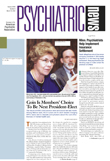Just a month after the terrorist attacks of September 11, psychiatrists and mental health professionals braved the skies to attend APA’s 2001 Institute on Psychiatric Services (IPS) in Orlando and headed home better prepared to handle patient-related trauma and disaster response.
While attendance was lower than at some recent institutes, enthusiasm about the educational quality of the sessions was high. A total of 1,447 people attended the 2001 meeting, a drop of about one-third compared with the 2,141 who came to the 2000 meeting. Of those who attended the 2001 meeting, 1,084 were registered to attend the scientific sessions. The others were exhibitors (239), press (15), staff (58), and nonregistered, nonmember faculty (51).
The institute, held annually in the fall, is centered on clinical care. It is also interdisciplinary in nature and draws both APA members and mental health professionals from several disciplines. The relatively small size of the meeting encourages participation and discussion among participants.
A report from APA’s Department of Continuing Education highlighted these and other data from the meeting and includes comments from attendees. Kathleen Debenham, director of that department, prepared the annual post-institute report.
General evaluation forms were placed in all registration packets and distributed to attendees at each session. In addition, forms were mailed to nonrespondents after the Orlando meeting. Staff collected 359 general evaluation forms and 1,178 forms assessing commercially supported sessions.
An overwhelming majority of those who filled out the general evaluation—97 percent—rated the overall quality of the educational sessions as excellent.
A total of 86 percent of registrants thought that the industry-supported symposia provided a balanced view of the topics, and 95 percent agreed that within the sessions, multiple views were presented. More than 98 percent agreed that the quality of the industry-supported symposia were excellent.
9/11 Sessions Created on Site
“Given the dark cloud under which people came to the meeting, there were at least some positive outcomes in Orlando,” said Debenham, referring to the fact that attendees had the rare opportunity to shape the October meeting by helping to create nine new sessions on site. Debenham said that the Scientific Program Committee, chaired by Harvey Bluestone, M.D., acknowledged that this year’s attendees brought unique needs to the meeting. During the Opening Session, APA President Richard Harding, M.D., canvassed the audience for ideas about what sessions they would like to see incorporated into the meeting. Attendees volunteered specific ideas for sessions that became a reality during the next few days.
The new sessions included “Disaster Response: Providers Taking Care of Providers,” “Disaster Response—Oklahoma City: Lessons for Today,” and “Working With Children and Adolescents After Disaster.”
“Because of their participation,” said Debenham, “attendees seemed to feel a greater sense of involvement and ownership of the meeting.”
Other Sessions Rated Highly
Attendees also could focus on HIV/AIDS or community psychiatry in two special full-day sessions. APA’s Office of HIV/AIDS, in conjunction with the Columbia University HIV Mental Health Training Project, the Florida AIDS Education and Training Center, and the Puerto Rico/Florida Veterans Integrated Service Network (VISN 8), offered the session “Treatment and Care in the Decade of AIDS,” which drew an audience of 120 people. The majority of attendees (91 percent) said they would recommend this training to others, the evaluations showed. There was also a full-day session that focused primarily on training for residents, titled, “Clinical Approaches to Working With Homeless, Mentally Ill Individuals.”
Acting on suggestions from attendees at the 2000 meeting in Philadelphia, the Scientific Program Committee planned more sessions about psychotherapy and its clinical applications and added more women and minorities to meeting faculty. The Scientific Program Committee plans to incorporate sessions related to certain topics suggested by attendees in Orlando into the 2002 institute in Chicago. The most frequently suggested topics included disaster and trauma related issues, administrative psychiatry, child psychiatry, and substance abuse issues.
The next Institute on Psychiatric Services will be held in Chicago from October 9 to 13. More information can be obtained from Jill Gruber, associate director of the Institute on Psychiatric Services, by phone at (202) 682-6396 or by e-mail at [email protected]. ▪
